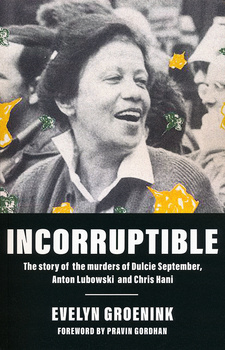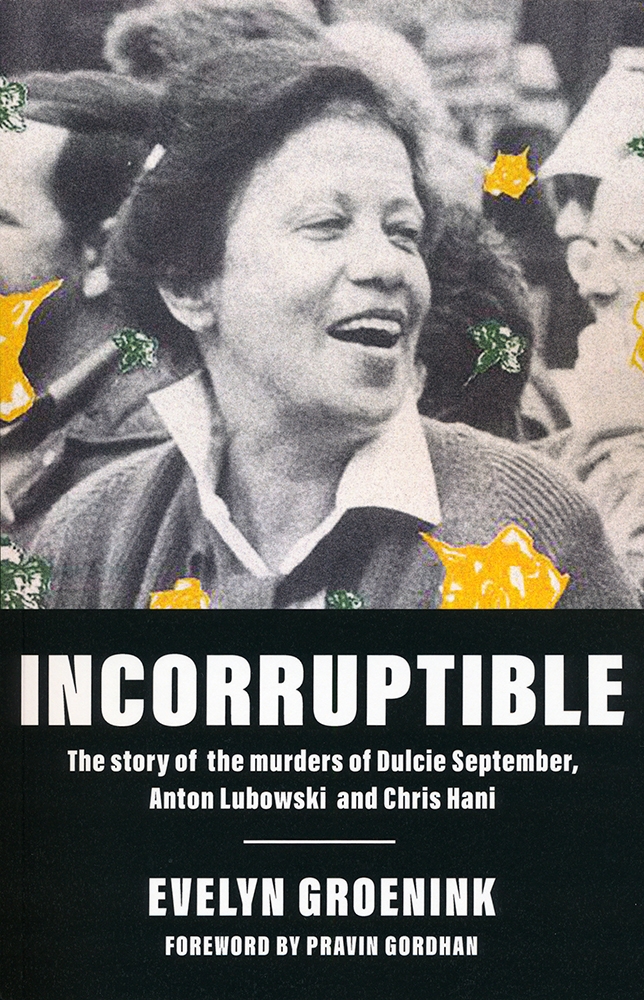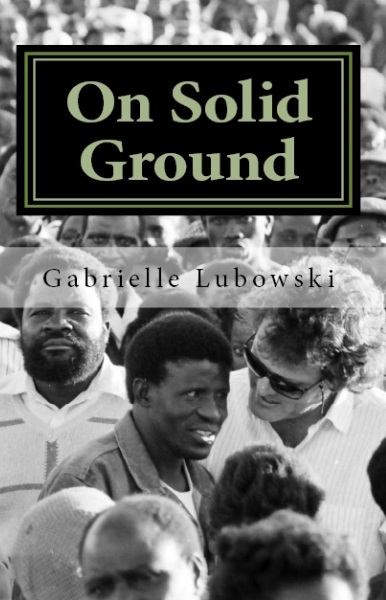Incorruptible: The story of the murders of Dulcie September, Anton Lubowski and Chris Hani, by Evelyn Groenink

The story of the murders of Dulcie September, Anton Lubowski and Chris Hani, by Evelyn Groenink. Cape Town, South Africa 2018. ISBN 9780639926803 / ISBN 978-0-6399268-0-3
Incorruptible: The story of the murders of Dulcie September, Anton Lubowski and Chris Hani. Conspiracies are often the brainchildren of a sensationalist press's fantasies. Evelyn Groenink's facts and arguments, however, do indicate a real pattern, on the basis of investigation and comparison of witness statements she finds, time and time again, the same circuit: arms trade, illegal diamond trade, bribery.
Chapter 2: Faction fighting (Paris, May 1988)
"Communist murdered September" some French newspapers shout. As if to prove that their boss, Minister Pandraud, was right when he blamed "internal faction fighting" for Dulcie's death, the Paris brigade criminelle has arrested a young man who is described as "a member of the communist faction in the ANC". He is a South African draft dodger, or rather war resister, by the name of Martyn van Geems. It is ironic that he should be accused of murdering an ANC activist, since the killing of ANC activists is a pastime usually associated with the army he refused to join. He is young and skinny, this Martyn van Geems, an activist and an artist. Human rights posters, his own paintings and a guitar decorate his small flat. He has recently earned some money painting arty banners for the French communist party's annual festival and he also spends some of his time as an anti-apartheid volunteer, helping out at the ANC's Paris office, where he had befriended Dulcie September. He had been happy with the friendship, which could never have existed within apartheid South Africa. There, he had been isolated, labelled a "traitor" and a "coward". In Paris he composes songs about the South African tragedy; sings them, accompanied by his guitar, for small audiences of French supporters. In the refugee centre on the outskirts of Paris, where he had stayed for almost a year, he had met a Chilean named Amaryllis. The two had become lovers. Still emotional, he narrates how, two weeks ago, he and Amaryllis had been rudely woken from their bed in the dark of night, and ordered to step outside. They had been taken to the police station where they were interrogated by five detectives, the whole night long, for the murder of Dulcie September. Martyn van Geems did not know that Dulcie was supposed to have been a "Trotskyite". "And I don't think that is even true. She was always on very friendly terms with the communists." He still trembles as he remembers his experiences with the brigade criminelle. "It was spooky. Having to come out into the cold, in your pyjamas, with no explanation, being pushed into a police car - it reminded me of South Africa." At the police station, under bright lights shining directly into his face, he was told that if he hadn't killed Dulcie for a political reason, he must surely have had a sexual motive. "You were screwing that woman, they shouted. It was so filthy." He had once, on holiday, sent Dulcie a postcard. That postcard was now waved about as "evidence" of a sexual and ultimately murderous relationship. It did not only embarrass him in front of Amaryllis, it also sullied the memory of Dulcie, the friendly political teacher and comrade from home whom he had been proud to know. "In the end even the guy who was interrogating me admitted he did not believe I had anything to do with the murder, but that anyway he had to do his job." The worst thing in the end is that the real murderers got away with it, Van Geems concludes despondently. "Our arrest gave them time to get away. Pandraud and the brigade criminelle did that." He, too, has seen the news reports about South African death squad commander Dirk Stomberg, who was seen in Paris shortly before the murder. [...]
This is an excerpt from Incorruptible: The story of the murders of Dulcie September, Anton Lubowski and Chris Hani, by Evelyn Groenink.
Title: Incorruptible
Subtitle: The story of the murders of Dulcie September, Anton Lubowski and Chris Hani
Author: Evelyn Groenink
Genre: Recent History
Publisher: Evelyn Groenink
Cape Town, South Africa 2018
ISBN 9780639926803 / ISBN 978-0-6399268-0-3
Softcover, 15 x 23 cm, 363 pages
Groenink, Evelyn im Namibiana-Buchangebot
Incorruptible: The story of the murders of Dulcie September, Anton Lubowski and Chris Hani
A rare example of excellent investigative journalism: Incorruptible. The story of the murders of Dulcie September, Anton Lubowski and Chris Hani.
Weitere Buchempfehlungen
On solid ground
On Solid Ground is a report on Gabrielle Lubowski’s life irrevocably changed when her husband ans SWAPO activist Anton Lubowski’s, was gunned down outside his home in Namibia in 1989.


